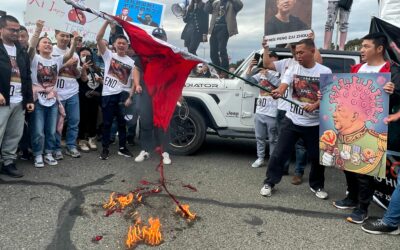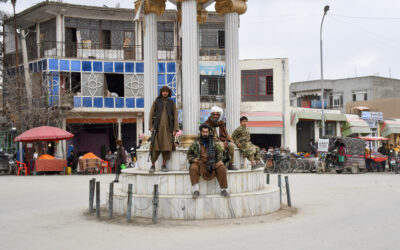
The Long Arm of China’s Security Services
SUBSCRIBER+ EXCLUSIVE REPORTING — When Chinese President Xi Jinping came to San Francisco last November to meet with President Joe Biden, Chinese pro-democracy activists in […] More
Cipher Brief Expert General Michael V. Hayden (Ret.) is a retired four-star General in the United States Air Force; he was the Director of the Central Intelligence Agency from 2006-2009 and the Director of the National Security Agency from 1999-2005.
OPINION — I am sitting here contemplating the news that John Rizzo is gone, victim of a heart attack this past weekend, and finding it hard to imagine a world without him. Hasn’t John always been there–always ready to offer sage advice on the stickiest problems we as a nation face? Isn’t he the fount of knowledge in the obscure area of intelligence law? Yes, he has and he is—and our nation is better for it and I will miss him.
For those who didn’t know John, he was the ubiquitous CIA lawyer—the “Company Man,” as he irreverently referred to himself in the title of his 2014 memoir, Company Man: Thirty Years of Crisis and Controversy in the CIA—who found himself at the center of every major national security and intelligence success or failure, victory or defeat, honor or scandal for most of our post-Vietnam, post-Watergate history. His career culminated in a run as Deputy General Counsel and, for most of those years, as Acting General Counsel. He worked for 11 CIA Directors and 7 U.S. Presidents. He and I worked closely during my time as NSA Director and Principal Deputy Director of National Intelligence, and I couldn’t have done my job as CIA Director without his daily advice and counsel. He was the final word on legality and ethics on the most sensitive intelligence operations and never shied away from them—a journey through his memoir is almost Forrest Gump-like in how he featured in so many of our nation’s recent historical moments. He was my wingman through some of the hardest decisions I’ve had to make—true life-and-death decisions in our war on terror—but also kept me out of trouble on more mundane issues—like which gifts from foreign potentates I could keep (not many).
You may wonder, how did John succeed so long in such a critical role? I believe the other ten CIA directors he served would agree it was a combination of intellect, integrity, patriotism, wit, and humility. No one in U.S. history understood the field of intelligence law like John—in fact, John wrote the book on intelligence law. Never one to go it alone, John worked closely with Department of Justice colleagues, law school academics, judges and justices, legislators, and his IC colleagues to make sure there was consensus in legal interpretation where possible and understanding of differences when impossible. Where there were gaps to the legal foundation, John helped craft legislation and regulations to underpin our work.
His advice was always offered in the best interests of the nation, to protect the men and women of the Agency and U.S. Intelligence Community, and never for his self-aggrandizement. He loved his country and its intelligence services—and he did everything in his power to ensure that no one would knowingly violate the law. There are many an operations officer with a really cool idea who had to forego it after consultation with John, but many more who proceeded with the confidence that John, and more importantly the law, had their back. As George Tenet has said, “[N]obody worked harder to protect the nation and the men and women of the CIA.”
John’s sense of humor was legendary—often presented in a dry understated fashion. I can picture him even now at one of our morning staff meetings, offering a wry comment on some otherwise deeply serious matter. As Porter Goss described it—”his cheery take on some of the absurdities infecting our culture today.” That taste of humor is what often cleared the palate so we could more seriously reflect on our options going forward.
John was truly humble. Sure—he had style. Often the first impression someone had of John was his sartorial splendor. I’ll never forget his tailored suits, his technicolor array of matching ties, cravats, and socks, his never-ending supply of cufflinks, his suspenders (“braces!” I’m sure he’d correct me), and carefully combed hair and groomed beard. But this clothed an often-understated intellectual approach grounded in a humility to the Constitution and the law and an awe of the great power entrusted in the Agency and the IC. My fondest moments with John were those one-on-one quiet discussions we would have in his office down the hall and around the corner from mine, where I would more often be student to his teacher on the finer points of law.
John could be passionate, defending specific points of law or case strategies and especially the men and women who populated legal offices at CIA and across the IC. And that is his true legacy. When John entered CIA there were very, very few lawyers. In fact, he took “a total shot in the dark,” as he put it, and floated a resume to CIA in the aftermath of the Church-Pike Committee hearings figuring CIA probably needed some. He came quickly to realize that CIA operations well-grounded in law, supported by lawyers, would better protect the institution, giving it greater running room, and ultimately better safeguard the nation. Most lawyers working at CIA and across the Intelligence Community today were hired and cultivated by John. And that’s a good thing for America. In fact, the U.S. Intelligence Community today has more lawyers than some of our foreign partners have intelligence officers!
Additionally, many of the lawyers working intelligence and national security issues at the finest law firms started as CIA lawyers under John’s tutelage. Corporate America, particularly its defense and intelligence sector, also owe John a debt for the fine counselors populating their legal departments. Also, there are few precedents in intelligence law that were not established in cases under John’s leadership. Most of the law and regulations governing intelligence behavior today were crafted or influenced by John and those he trained. And in an area important to many lawyers, I’m pretty certain CIA’s and the IC’s win-loss percentage in court or in judge’s chambers under John’s guidance would best the most storied football or baseball franchises—even his beloved Red Sox.
Sadly, there are those who misunderstand his role in shaping CIA’s rendition, detention, and interrogation program established in response to the attack on the U.S. on 9/11. But for those of us who know, no one took more care to ensure that these programs were grounded in and did not exceed U.S. law existing at the time, constantly seeking legal rulings from the Department of Justice and political blessing from the White House and key members of Congress. And he wasn’t shy about shutting the program down on several occasions as the legal underpinning shifted with court decisions or changes to the law. Were aspects of the program unpleasant? Of course, John has said so, in fact describing some of the techniques as “terrifying,” But he also has reminded us of the tenor of the times—no one in America—the President, Congress, the American people—would forgive CIA if it hadn’t done everything within the law to prevent another 9/11-style attack from happening. Period.
John shared the view that all CIA directors from George Tenet to Leon Panetta hold—the program yielded valuable and critical intelligence that prevented attacks against America and its allies, but that it is also unknowable whether the same information would have been obtained without those techniques.
CIA did what was needed and the nation remained safer as a result. In the end, John was among the many at CIA who answered the bugle’s call, who didn’t run the other way, who didn’t waffle in the face of great crisis. For that, I call him an American hero.
Rest in peace, John, and clear sailing.
This column has been updated to clarify earlier edits
Have a memory of John you’d like to share? Email us at [email protected] and we will post memories here.
Statement from Former Director of Central Intelligence George Tenet on the passing of John Rizzo:
“There was nobody more dedicated to the protection of CIA and its officers than John Rizzo. He had a first class legal intellect while at the same time being street smart and tough. John was elegant, sartorially splendid, and yes even flamboyant. Yet he was to his core, a humble and dedicated public servant, a company man to his last breath. I, and the CIA family, have all lost a loyal friend and colleague. It was my privilege to serve alongside this wonderful man. His loss to me is crushing. I will sorely miss his friendship and humor. John was more than just a lawyer, colleague, and friend; he provided all of us the institutional ballast and integrity needed during the most difficult moments. The only solace for all of us is that he will be reunited with his beloved wife Sharon who passed away just a few months ago. As the Greeks say, may his memory be eternal and everlasting. It surely will be.”
Statement from Former Director of Central Intelligence Porter Goss on the passing of John Rizzo:
“No good deed goes unpunished”- and CIA did plenty of good deeds over the many years John Rizzo faithfully served the Agency and its people. John took the “hits” for some of those good deeds- and never did get confirmed as CIA’s General Counsel despite his loyal service as Acting General Counsel for several stretches in unusually challenging times. John was a man of honorable character, an accomplished attorney, good company, thoroughly steadfast in his responsibilities. Some might say his style of haberdashery bordered on flamboyant but he was always impeccably stylish. I trusted him completely, enjoyed his sense of humour and followed his thoughtful guidance on many a tough call. We have kept in touch since those Agency days- I will miss him and his cheery take on some of the absurdities infecting our culture today. John epitomizes the unsung heroes of the clandestine service who day in and day out quietly keep the info flowing despite the braying of the nay-sayers. Rest In Peace , John
Read more expert-driven national security insights, perspective and analysis in The Cipher Brief
Related Articles

SUBSCRIBER+ EXCLUSIVE REPORTING — When Chinese President Xi Jinping came to San Francisco last November to meet with President Joe Biden, Chinese pro-democracy activists in […] More

SUBSCRIBER+EXCLUSIVE EXPERT PERSPECTIVE — More than two years after its withdrawal from Afghanistan, the U.S. still does not have a clear way forward in the […] More

SUBSCRIBER+ EXCLUSIVE REPORTING — Ukrainians greeted Saturday’s long-awaited House passage of $60.8 billion in aid with justifiable jubilation. For months, their soldiers, civilians, and political […] More

SUBSCRIBER+ EXCLUSIVE REPORTING — A race for control of space is underway, and just as on earth, the U.S. and China are the top competitors. […] More

SUBSCRIBER+ EXCLUSIVE REPORTING — For nearly a week, the Middle East and much of the world were on a knife’s edge, waiting for a promised […] More

BOTTOM LINE UP FRONT – Less than one week after Iran’s attack against Israel, Israel struck Iran early on Friday, hitting a military air base […] More
Search